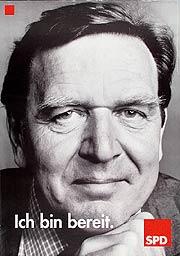- Bundestagswahl 2005 - Elections in Germany

On September 18, 2005, the 16th Bundestags (federal) election (since 1949) was held in Germany in order to establish the Bundeskanzler (Chancellor) and his or her Cabinet, who will be directing the course of national and international German politics and policies for a term of 4 years. In this special election, which was called by the Bundespräsident to be held 17 months prior to the end of the regular four year cycle, seven distinctive political parties were on the ballot and 77.7 percent of all eligible voters participated.
In a bitter fight of rhetoric and ideology the two major rival parties, the SPD as embodied by Gerhard Schröder, and the opposition party CDU as represented by Angela Merkel, had vied for the mandate of the German voter. The outcome, in percent of votes cast, is as follows:
The Social Democratic Party SPD 34.3% - the right-of-center Christian Party CDU 27.8% - the CDU-affiliated CSU 7.4% - the Green Party 8.1% - the classical liberal FDP 9.8% - The Leftists 8.7% - and miscellaneous fringe parties 3.8%.
In accordance with German Parliamentary law, in cases where no single party has a majority on its own, a coalition government must be formed. At present rumors abound as to which party the CDU/CSU will choose for their coalition partner. This choice will affect the appointments to all government posts, and will dictate the political platform of German national and international policy. As of now, this momentous decision has not been made.
Germany, along with Great Britain and France, is a powerful member of the EU (European Union) and, by extension, the German heads of government will exert significant influence on global issues. The formation of the new German government will be a strong indicator of the future role Germany will play on the World Stage.
Meanwhile, AMALGAMATED PERSPECTIVES encourages you to seek out European and International media resources in order to stay informed on global issues, as we find the American media coverage of international events to be minimal, simplistic and all too often biased.
.
[See also: Bundesrepublik Deutschland - a Federal Representative Democracy]
.
[Read the Follow-up Article: "Whois the German Chancellor?"]
.
Labels: Amalgamated Perspectives, Germany, politics









0 Comments:
Post a Comment
Leave your feedback : We want to hear from you!
<< Home